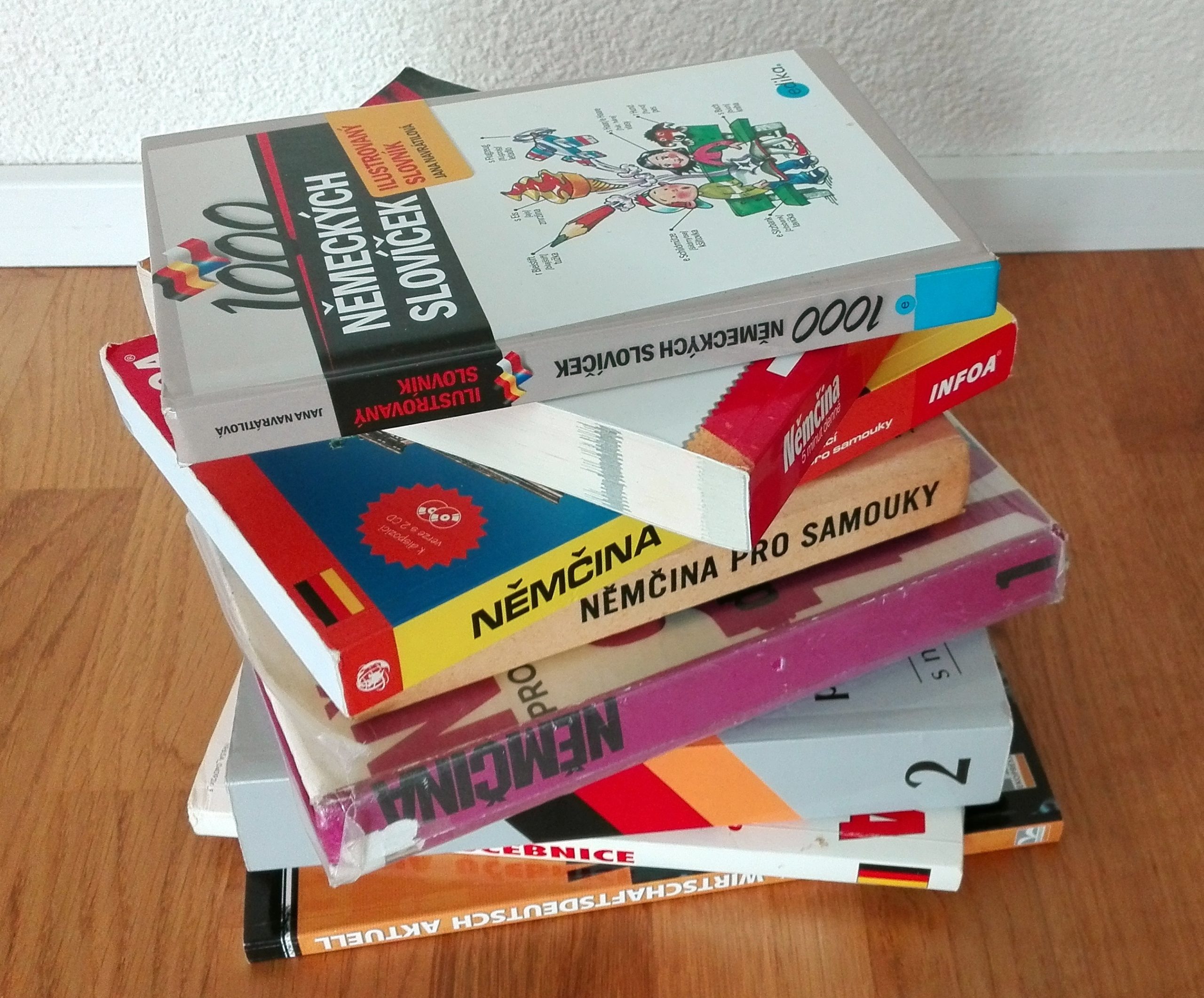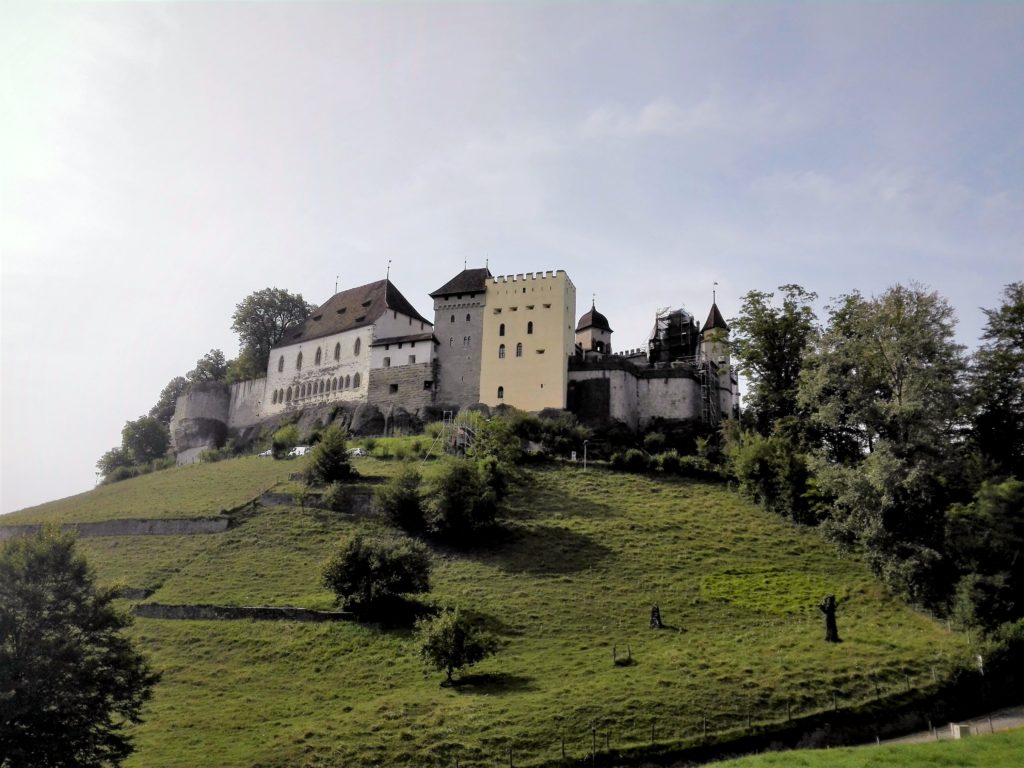Kdysi na konci páté třídy jsem se zařekla, že se už nikdy nikdy nikdy nebudu učit německy! Měla jsem za sebou tři roky němčiny a tento jazyk mi vážně k srdci nepřirostl. Ale osud tomu chtěl, že jsem se před dvěma lety německy musela začít znova učit. A já jsem s údivem zjistila, že mi němčina nezní zase tak strašně jako dřív a já se ji učím ráda. Tomu se říkají životní paradoxy. Ve dnešním příspěvku proto najdete 5 způsobů, jak se učit místní jazyk, když žijete v zemi, jejíž řečí nevládnete.
1. Integrační kurzy pro cizince
Zkuste se poptat na místní radnici nebo v komunitním centru, zda takové kurzy náhodou neorganizují. Jestli ano, s největší pravděpodobností budou nějakým způsobem dotované a za jednu lekci neutratíte majlant.
Já jsem měla štěstí, že v naší vesnici se takové kurzy pořádají. Byl to rozhodně dobrý start, jak se „skamarádit“ s němčinou. Součástí tohoto našeho kurzu je i hlídání dětí, protože děti si také mohou osvojit cizí jazyk formou hry. Také jsem tady potkala spoustu zajímavých žen takřka z celé Evropy (z Polska, Itálie, Španělska, Portugalska, Makedonie…), ale i z dalších částí světa (ze Srí Lanky, Indie, Ghany nebo Kostariky). Stále tento kurz navštěvuji, i když myslím mám už trošku vyšší úroveň, než která se tady vyučuje. Ale baví mě setkávat se s těmito ženami, protože to člověka obohacuje i kulturně a já se už teď teším na náš každoroční „Mu-Ki“ (Mutter-Kinder) výlet (o našem prvním výletu jsem psala tady).
2. Instituce nabízející profesní vzdělávání
Určitě ve vašem okolí najdete vzdělávací instituci, která nabízí další vzdělávání např. v oblasti IT, rozvoje komunikačních a prezentačních dovedností nebo další profesní kurzy. Jsem si jistá, že mezi těmito kurzy určitě naleznete i nějaký ten jazykový.
3. Firemní kurzy
Zeptejte se svého zaměstnavatele, jestli nenabízí jazykové kurzy v rámci firemních benefitů. Možná takové sám organizuje ve vlastních prostorách, možná spolupracuje s nějakou jazykovou školou, která vám díky tomu nabídne zajímavou slevu na školném.
4. Jazykové školy
Sedněte k internetu a zkuste najít co nejvíc jazykových škol v okolí. Pak hledejte a srovnávejte, čtěte recenze bývalých studentů. Kvalita jazykových škol se může různit a stejně jako u ostatních věcí i tady platí: nemusí znamenat, že ta nejdražší škola je zároveň ta nejlepší.
5. Individuální kurzy
Je hodně soukromých učitelů, kteří vám rádi nabídnou své služby (osobní lekce, anebo třeba i on-line výuku přes Skype). Ale také v tomto případě platí to, co jsem psala v bodě 4. Hledejte, srovnávejte, snažte se najít pro sebe tu nejlepší variantu.
(mimochodem, manžel je velmi spokojený s lektorkou
Frau Annette Wermuth))*
Kromě výše uvedených způsobů se snažte co nejvíce vzdělávat v jazyce sami: poslouchete rádio, dívejte se na filmy a seriály, mluvte s místními lidmi, čtete noviny/blogy/komentáře na sociálních sítítch atd.A co vy? Museli jste se někdy učit cizí jazyk „z donucení“? A jak jste to zvládli? Co vám nejvíc pomohlo? Napište mi do komentářů!
Pokud nechcete přijít o nejnovější příspěvky na mém blogu, staňte se jeho pravidelným čtenářem a zaregistrujte se v pravém horním rohu této stránky. Děkuji. Nezapomeňte mě také sledovat přes Facebook, Pinterest,a Instagram.
A samozřejmě se těším na všechny vaše komentáře!
*) toto není sponzorovaný příspěvek, ale kdyby byl, nezlobila bych se 😉
Once, at the end of fifth grade, I vowed to myself to never never never learn German! At that time I had been learning German for three years and the language hadn´t grown on me. But as fate would have it, it was two years ago, I had to start learning German again. And to my great astonishment, this language doesn´t sound so awful as ever, and I love learning it. This is called the paradoxes of life, I believe. So in my today´s post, you will learn 5 ways how to learn the local language, if you live in a country whose language you don´t speak.
1. Integration courses for foreigners
Try to ask at your local municipality or community center, if they organize such courses. If so, it may be that they will be subventioned and the prize for one lecture won´t be so high.
I was lucky that we have such a course in our village. It was great for the beginning of „making friendship“ with German. They also offer babysitting, which is great because kids can learn the language too by playing. And of course, I met there a bunch of inspiring ladies from literally all over Europe (Poland, Italy, Spain, Portugal, Macedonia…) and also other interesting parts the world (Sri Lanka, India, Ghana, Costa Rica…). I still attend this course, although my level of German is now higher as that is being taught there. But I love meeting those ladies and there is always chance that I learn something new.
2. Organizations offering further education
There are surely in your neighborhood educational institution, that offer e.g. courses in computers, presentation & communication skills or other vocational courses. I´m sure they will offer language courses too.
3. Corporate courses
Try to ask your employer if he offers language courses as a fringe benefit. Maybe they organize them in their premises and have hired teachers on their own, maybe they have a contract with some of the local language schools and offer you a reduced fee.
4. Language schools
Search the internet and try to find as many language schools as possible. Spend some time and check the reviews of former students. The quality of language schools can differ and like with many other things: the highest prize doesn´t have to ensure the highest quality of language education.
5. Private courses
There are lots of freelance language teachers and also, in this case, follow my point 4. Check, compare, try to find the best solution. Maybe instead of one to one classes, Skype lessons would work for you?
Beside above-mentioned ways, try also as much as possible listening to the radio, watching movies, talking to the locals, reading newspapers (blogs/comments on Instagram etc.)
And what about you? Have you ever been forced to learn a foreign language? What have helped you most? Tell me in the comments bellow!
If you don´t want to miss any of my recent posts please sign up for my blog in the top right-hand corner of this page. Thank you 🙂
I will appreciate any time if you share my posts on Facebook or Twitter. It helps get my blog out to more people, who may like my posts.
And of course, I look forward to reading all your comments.
And don´t forget to pin this on Pinterest!
*) this is not a sponsored post, but I´m open for sponsors 😉


















8 komentářů. Nechte nové
Being Swiss I learned French, English, Italian (and Spanish) at school. Unfortunately back then they started us on languages only in high school (age 12 and older). I am so glad that these days they begin with English lessons in elementary school. Teach them while their brains are like sponges, right?
Of the options you list, I love the community one best – for the friendships with like-minded people and the childcare 🙂
Congratulations on learning German, I know it's tough, but it will make your life so much easier. One day there may be a third button in your blog posts: Czech, English, German!! 🙂
That would be nice, but I´m afraid it´s still a long way to go 🙁
Anyway, I admire how you Swiss are language-skilled. That´s absolutely amazing!
Great tips. I would love to learn another language.
Cristy
http://www.happyfamilyblog.com
And which one would you choose? Do you have any favourite language you´d like to learn?
The only language I've ever had experience 'learning' was French and I really struggled with it all throughout school. I think it's interesting you swore you'd never learn German and now as an adult you're giving it another try!
https://dontbedumbbeyou.wordpress.com/
I must admit from my own experience, that French is quite hard to learn. But German is even worse, believe me 😀 But I´m really trying (but still struggling ;))